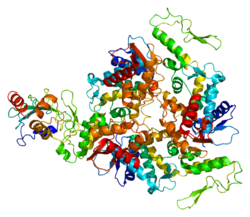
据《自然》杂志网站近日报道,美国北卡罗来纳大学医学院领导的一项最新研究发现,一种普通的抗癌药物能打开小鼠脑中处于休眠状态的父方等位基因UBE3A,为治疗天使人综合征及其他神经基因紊乱疾病带来了希望。新研究表明,抗癌药物能激活沉默的等位基因,在治疗基因组印记紊乱类疾病方面具有潜在价值。
每个人都从父母双方那里遗传了一套基因副本,叫做等位基因,但在神经系统中,只有来自母方的基因被表达,父方基因在一种叫做“印记”的过程中被关闭了。UBE3A是UBE3A蛋白的基因编码,调控着多余蛋白质的分解,与神经系统发育过程密切相关。在天使人综合征中,70%的患者来自母方的UBE3A等位基因发生了变异或缺失,因此无法产生UBE3A蛋白。天使人综合征也叫快乐木偶综合征,最早发现于1965年,患者特征是动作像木偶、癫痫、学习能力低下和频繁地发笑。全球每15000新生儿中约1名天使人综合征患者。
如果能打开父方等位基因,让其在神经细胞中制造出有功能活性的UBE3A蛋白,就可能找到治疗天使人综合征的药物。为此,北卡罗来纳大学医学院细胞生物学家本杰明·菲尔波特和马克·兹卡领导的研究小组筛选了大约2300种化合物,发现一组叫做局部异构酶I抑制剂的抗癌药物能做到这一点。局部异构酶是一种在复制过程中连接DNA的蛋白质,能帮助染色体复制。而局部异构酶抑制剂会让这种连接无限地持续下去,甚至破坏DNA。
他们给小鼠注射了一种叫做拖补替康(topotecan)的药物,观察它们神经元中UBE3A的表达水平。结果发现,不仅父方等位基因被激活,而且这一效果在治疗后持续了12个星期。目前研究小组还不知道它的确切机制,但兹卡说,药物好像减少了反基因副本UBE3A-ATS的表达,而这种反基因副本通常用来锁住父方UBE3A的表达。
目前,对天使人综合征患者的治疗只能针对他们出现的各种症状,而不能治本。“我们的研究为治疗天使人综合征带来了希望。从理论上讲,还可能治疗其他类型的神经基因失调。” 布鲁塞尔自由大学神经儿科医师伯纳德·丹说。

Topoisomerase inhibitors unsilence the dormant allele of Ube3a in neurons
Hsien-Sung Huang ,John A. Allen ,Angela M. Mabb Ian F. King, Jayalakshmi Miriyala, Bonnie Taylor-Blake,1Noah Sciaky, J. Walter Dutton, Hyeong-Min Lee, Xin Chen, Jian Jin, Arlene S. Bridges, Mark J. Zylka, Bryan L. Roth, & Benjamin D. Philpot
Angelman syndrome is a severe neurodevelopmental disorder caused by deletion or mutation of the maternal allele of the ubiquitin protein ligase E3A (UBE3A)1, 2, 3. In neurons, the paternal allele of UBE3A is intact but epigenetically silenced4, 5, 6, raising the possibility that Angelman syndrome could be treated by activating this silenced allele to restore functional UBE3A protein7, 8. Using an unbiased, high-content screen in primary cortical neurons from mice, we identify twelve topoisomerase I inhibitors and four topoisomerase II inhibitors that unsilence the paternal Ube3a allele. These drugs included topotecan, irinotecan, etoposide and dexrazoxane (ICRF-187). At nanomolar concentrations, topotecan upregulated catalytically active UBE3A in neurons from maternal Ube3a-null mice. Topotecan concomitantly downregulated expression of the Ube3a antisense transcript that overlaps the paternal copy of Ube3a9, 10, 11. These results indicate that topotecan unsilences Ube3a in cis by reducing transcription of an imprinted antisense RNA. When administered in vivo, topotecan unsilenced the paternal Ube3a allele in several regions of the nervous system, including neurons in the hippocampus, neocortex, striatum, cerebellum and spinal cord. Paternal expression of Ube3a remained elevated in a subset of spinal cord neurons for at least 12?weeks after cessation of topotecan treatment, indicating that transient topoisomerase inhibition can have enduring effects on gene expression. Although potential off-target effects remain to be investigated, our findings suggest a therapeutic strategy for reactivating the functional but dormant allele of Ube3a in patients with Angelman syndrome.
文献链接:https://www.nature.com/nature/journal/vaop/ncurrent/full/nature10726.html








